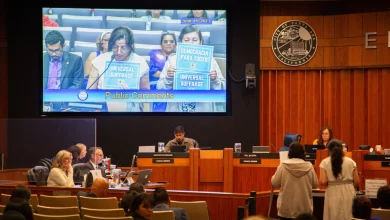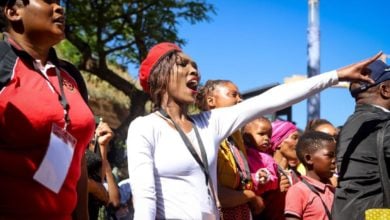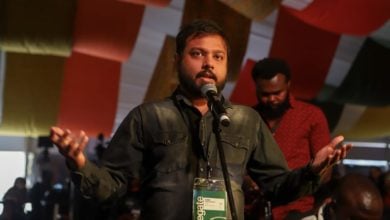1) You are a socialist, black woman candidate in 2012 presidential election. What do you think you are adding to this presidential race?
Our campaign is built around the idea that we need a new system in the United States, not just new politicians. The Republican and Democratic parties share a common commitment to protect the economic domination of the small class of Wall Street banks and corporations. Globally, they share a common goal to protect and expand the U.S. Empire. They disagree over some issues, and they have different constituencies, but these are mostly tactical disagreements between elites. Neither party represents the interests of poor and working people or of oppressed nationalities.
The PSL’s campaign is the exact opposite. It is anti-capitalist and is calling for the major private banks to be seized. These banks control so much of society’s wealth and were bailed out with taxpayers’ money in 2008. If the banks were seized and controlled by the people, this liberated wealth could immediately provide jobs for all, free education and health care, and housing as a constitutional right.
Individually, as a working-class Black woman, I can speak to the experiences of sectors of the population who are typically neglected by the two big-business parties. Black communities face much higher levels of unemployment and poverty, constant police harassment, and a racist criminal justice system. Neither of the two other parties will touch these issues. The same thing is true with women’s rights, which are under continuous assault; the Democrats have done nothing to stop this, but our campaign calls for a new militant women’s movement.
2) Looking from another part of the world, many people in Turkey would not even think of using socialism and the US in the same clause. Is it difficult to defend a socialist program in the US especially in the presidential campaign?
For the decades of the “Cold War,” anti-communism was the unofficial religion of the United States, promoted constantly in the media, the school system, and by politicians. While much of that remains, I think it is easier now to speak openly as a socialist, and there is growing curiosity about socialism especially among young people. According to a poll last winter, 49 percent of young people have a favorable view of the word “socialism.” That’s because although they have been taught that capitalism is the greatest system, they look out at and see very high unemployment, stagnant wages, constant evictions and foreclosures, and increasingly unaffordable education and health care. Fifty percent of college graduates last year could not find work. There are 49 million people in poverty and another 97 million who are “near poverty.”
So no, it is not terribly difficult to talk about socialism—in fact, we are running our campaign because we are eager to debate these issues. We have been completely shut out of the corporate-owned media, and the electoral rules make it very difficult to get on the ballot. No candidate can be a serious contender unless they raise hundreds of millions of dollars. So those are the biggest challenges we have faced, those put up by the system. I believe if our message could reach millions of people, many more would gravitate to socialism.
3) How do people respond to a socialist program? Can you give examples from your campaign experience?
I have been on a speaking tour throughout the country, from California where I live, to the Southwest, the Midwest and now I’m on the East Coast. Everywhere I go I’m meeting people who are learning about the socialist perspective for the first time. Even those with very little political experience agree with us that the whole system is controlled by the super-rich. I often ask people if they think jobs should be a right in the richest country in the world. They say “yes.” I ask them if they think people should be allowed to stay in their homes without fear of eviction and foreclosure. They say “yes.” I go through the issues like this and then say at the end, “If you agreed with all these points, well that’s the socialist program.” Many people who might be afraid of the word socialism are surprised to find out that they already believe in key socialist concepts.
More than anything, I think people respond very well to the message that real change does not come from elections. That is clear with the experience of the Obama presidency. Change really comes from struggle, from people taking action. Even though we are running in the elections, we are using this as an opportunity to talk about building that sort of movement beyond the elections.
4) Last month (September) was the anniversary of the Occupy movement. Do you think the Occupy movement has made a difference regarding people’s reaction to the idea of radical change?
It has definitely made a difference in terms of putting a spotlight on the problems of inequality and the power of the banks. The terms it used—the 99% versus the 1%—are now part of the country’s common vocabulary. It also introduced a new generation of young people to activism, and this idea that we must “be the change” instead of waiting for change to be delivered to us. The movement was not built around a single ideology, but people from a range of perspectives participated and debated their ideas. I participated in Occupy L.A. and my running mate Yari Osorio was among 700 people who were arrested when the movement first took off. The movement is still alive, but has been made weaker because the government broke up all the encampments around the country, and arrested over 7,000 people in the last year.
5) How do you position yourself during the campaign? Do you particularly target at the Obama campaign? Why should people not vote for Obama?
We target both the Republican candidate Mitt Romney and Barack Obama, the Democratic candidate. Romney is understandably hated by millions of poor and working people. He is an arrogant representation of Wall Street power, and his party is an explicit enemy of immigrants, women’s rights, environmental regulation, etc. Virtually no Black people will vote for him.
Barack Obama was elected on the slogans of “hope” and “change.” He seemed to be the complete opposite of George W. Bush, who was probably the most hated president in history by the time he left office. But Obama has failed to deliver. He used some left-sounding slogans, but the Democrats are really a center-right party. They have deported more immigrants than Bush. They have instigated new wars and aggressions in the Middle East and Africa.
No longer able to promise hope and change, the Democrats’ basic line, ‘vote for us or it will get really bad.’ But things already are really bad, and voting for the Democrats has not changed the political drive towards austerity, expanding war, etc. That strategy of voting for the Democrats as the “lesser evil” has only weakened the people’s resistance, demobilizing and demoralizing those who should be fighting both major parties.
We understand why some people want to vote for Obama as the first Black president. That was a historic development given this country’s history of slavery and racism. But it was also an opportunity for the U.S. capitalism, which is no less racist, predatory or imperialist today than four years ago, to remake its image. Having Obama as the president during the economic crisis has helped the system because it has kept many oppressed people from fighting back. That’s the sort of fighting movement our campaign represents and wants to help unleash.
6) Do you have a foreign policy agenda?
Yes, we believe socialists in the United States have a special responsibility to oppose and try to weaken imperialism from within. Our campaign calls for the closure of all U.S. military bases around the world to bring all the troops, planes & ships home. That includes an immediate end to the occupation of Afghanistan, the removal of U.S. personnel from Iraq. We also make a special point to call for the end of U.S. aid to Israel, and to end the 50-year blockade of revolutionary Cuba.
We in the PSL make a special point to build solidarity with movements for national liberation, and to defend countries that are targeted for imperialist regime change only because they have dared to chart an independent path. We also explain that despite all the patriotic propaganda, the forces of militarism also hurt the welfare of the people of the United States. They send service members, often drawn into the military because of lack of economic opportunity, to kill and be killed in the pursuit of profit. They also drain public resources—many of the country’s budgetary problems could be instantly resolved by shutting down the enormous war machine.
7) What do you think about the role of the US in the Middle East? How would socialism change this role?
The U.S. government, whether led by a Democrat or Republican, has made the plundering and re-colonization of the Middle East a key strategic objective. For the sake of geopolitical control, especially over oil resources, they have deposed democratically elected governments, propped up the apartheid state of Israel, imposed genocidal sanctions and launched vicious war on the people of Iraq. The U.S. government has taken the opportunity of the “Arab Spring” to again play this interventionist role. Although they use flowery “democratic” phrases, their designs are no less sinister.
A socialist foreign policy to the Middle East would be based on the principles of solidarity, self-determination and mutual cooperation. It would, as a first gesture, require reparations for the vast wealth extracted from the Middle East, and the crimes committed against it. The era of wars of aggression would end, as all the U.S. troops would be brought home and the military bases dismantled. I became a youth organizer in the mass movement that developed to oppose the wars against Afghanistan and Iraq. Millions of people protested over the years to say: “The U.S. government acts in our name, but not with our consent!” That is our message today as well—we want solidarity with the people of the Middle East.
8) What is PSL’s position on the conflict in Syria?
Our principal objective here is to stop all intervention and interference from the United States and its partners in Syria’s internal affairs. We oppose the sanctions on the Syrian government, the funneling of weapons and money to the rebel forces, as well as the media campaign against the Syrian government, which is aimed to prepare people for a more direct intervention.
In terms of the situation on the ground, it is clear that reactionary and sectarian forces came to dominate the opposition as the internal conflict became fully militarized. The Syrian government would have likely defeated the reactionary and sectarian forces long ago were it not for the military, financial and logistic support by the United States and its partners in the region. In that sense, these governments are responsible for the continuation of the Syrian civil war and the possibility of a regional war. We are not ideological supporters of the Syrian government, but we defend it from these attempts to break it apart and subjugate it to foreign powers. A protracted civil war and regional conflict would be a disaster for the peoples of the Middle East.
9) In how many states is PSL listed in the ballot?
We are currently on the ballot in 13 states. In six of these states, the PSL candidates will be the only socialists on the ballot. The PSL will be on the ballot in every region of the country: the West – Colorado, Utah, Washington; the South – Arkansas, Florida, Louisiana; the Midwest – Iowa, Minnesota, Wisconsin; and the Northeast – New Jersey, New York, Rhode Island, Vermont.
10) What does it take to get ballot access as a third party candidate? Is it easy or difficult?
It is extremely difficult. Each state sets its own regulations for how to get on the ballot—there is no national standard or unified national ballot. To get on the ballot in 50 states requires 50 separate efforts, each with their own deadlines and rules. Some states require so many petitions to get on the ballot that it is practically impossible, or would require millions of dollars to succeed. As a result, in some of the states where we have the most supporters, the requirements are so high that we will not be on the ballot. We know what these laws are designed to preserve a two-party monopoly on political power.
Another undemocratic feature of the U.S. political system are the advertising and the debates. The two major parties will spend $2.5 billion, mostly on advertising, in the presidential campaign this year, which no working-class party can come close to matching. Even though I am on the ballot, the presidential debates are run privately, and they set entrance requirements that will exclude me and other smaller parties from participating.
11) You are 28 years old but according to the US Constitution you have to be at least 35 years of age to be president. Why are you nominated for presidency despite the statement in the constitution?
We consider the age requirement an undemocratic rule, considering that young people can vote, be tried as adults in courts, sent to war, and have our lives affected by the decisions of government every day. Why should we not be able to run for office?
The fact is that the corporate-owned media does not take third-party challengers seriously, even if we meet all the legal requirements. They only cover the Democrats and Republicans and present them as the two sole “legitimate” candidates.
My running mate is young immigrant from Colombia, who also does not meet the constitutional requirement to be born in the country. But this reflects who our campaign is trying to reach—young people, oppressed and working-class communities. People will be attracted to our campaign because of our message of struggle, not because they are expecting our candidates to win the White House.






